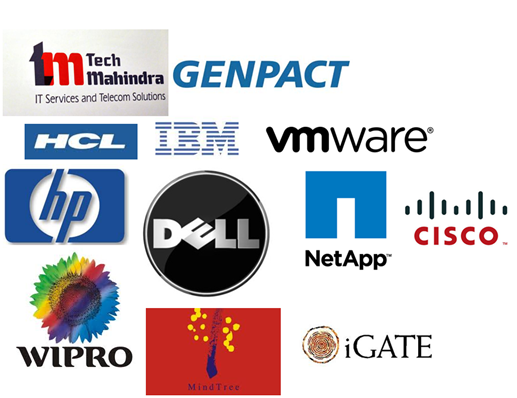Remote Infrastructure Management (RIM) refers to remotely managing IT infrastructure such as workstations, servers, network devices, storage devices, IT security devices of an organisation. The remote monitoring of the IT infrastructure is undertaken through offshore/near-shore/global delivery centres which are termed as Operations Management Centres (OMC), where skilled IT staff of a service provider monitors and manages the infrastructure, ensuring up times of servers and availability.
The IT staffs at a remote site performs functions just as easily as local teams using the operational procedure manuals and documented infrastructure management techniques. There are service level agreements (with penalties for downtime of servers) to ensure that the availability is optimal for users who depend on the infrastructure. Thus the local teams assure business continuity by monitoring system performance and proactively identifying the problems. They also conduct root cause analysis to fix problems expediently.
RIM sector includes various job profiles such as:
-
A UNIX Administrator must possess knowledge in UNIX systems security and secure system access programs, and should be able to implement system policies and procedures that support a UNIX processing environment. If the UNIX platform interfaces with the Internet, the administrator must be able to implement firewalls to protect software and data from outside intrusion. Job responsibilities also include creating input/output systems, networking schematics, storage routines for archiving of data on the system, and cataloguing for UNIX software development and applications. Performing data backup, loading UNIX system releases, troubleshooting and resolving system problems is also a part of the job.
Skills Required
- Strong inter-personal and communication skills: should be capable of explaining simple procedures in writing or verbally.
- Familiarity with UNIX and its commands/utilities at the user level is a must, can edit files using more than one editor, uses at least two shells one of them being the Bourne shell.
-
A Database Administrator (DBA) maintains a database system, and is responsible for the integrity of the data and the efficiency and performance of the system. Job responsibilities of a DBA include establishing the needs of users and monitoring user access and security; monitoring performance and managing parameters to provide fast query responses to front-end users; considering both back-end organisation of data and front-end accessibility for end-users; installing and testing new versions of the DBMS; writing database documentation, including data standards, procedures and definitions for the data dictionary (metadata). Controlling access permissions and privileges; developing, managing and testing back-up and recovery plans; ensuring that storage, archiving, back-up and running recovery procedures is also a part of the job.
Skills Required
- Given the critical nature of the data a DBA is in charge of, he must be well versed in IT, with a particularly good knowledge of DBMSs and the query language SQL, as well as knowing several programming languages.
- A keen understanding of DBMSs may be necessary for optimising queries, adjusting DBMS settings, or fine-tuning database access monitoring tools.
- Besides these technical skills, the database administrator must have a good understanding of the company's applications and be in a position to listen to users' needs when developing or editing a database.
-
A Network Administrator is responsible for keeping the network functioning at optimal levels. This includes the internal network (LAN), a company-wide network that encompasses multiple locations (WAN) as well as the connection with the outside world. Depending on the complexity of the network, other duties can include server maintenance and backup, email administration, assigning and maintaining user logon and access privileges, hard-wiring of jacks and workstations and protecting internal users from outside threats, including hackers, viruses, spyware and malware.
Skills Required
- Since a network administrator maintains network infrastructure such as switches and routers, he should be able to diagnose problems with these or with the behaviour of network-attached computers.
- Should be able to regulate user access to sensitive data & files to protect against internal security breaches.
-
IT Security Administrator is a specialist in computer and network security, including the administration of security devices such as firewalls, as well as consulting on general security measures. Security administrator guards data stored on a company's computer system. Implementing policies, as well as various types of software, monitoring interoffice networks and handling troubleshooting is also a part of the job.
Skills Required
- They must be organised analytical and capable of identifying and solving problems.
- Staying current with the latest technology monitoring and security programs are a must.
- They should possess excellent communication skills, quickly alerting management and employees when security has been breached or needs updating.
-
Storage & Backup Administrator is responsible for installing computer and software programs. Installation includes configuration of logical unit numbers to allow systems to perform at optimal level, back-up and restore and maximize cost-efficiency applications. Where applicable, they also install patches or upgrades to the server's hardware, firmware or software. On a regular basis, a storage administrator ensures that the information found in the database is thoroughly backed up. He should be able to predict how much the need for data storage will grow and understand how the various forms of storage space will be utilized.
Skills Required
- Excellent listening skills & ability to communicate clearly and fluently in English.
- Knowledge of various backup & storage tools like Netbackup Operation Manager, EMC BCV & NetApp snapshot, NearStore will be an added advantage.
 Featured Sector
Featured Sector

 Featured Sector
Featured Sector

